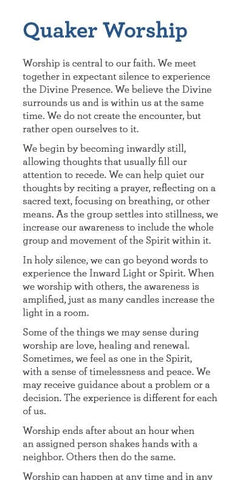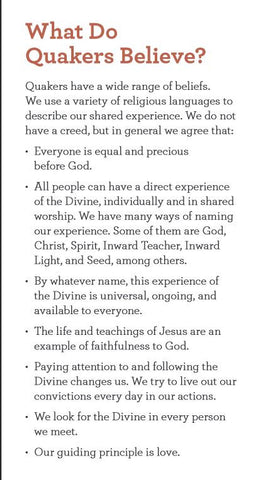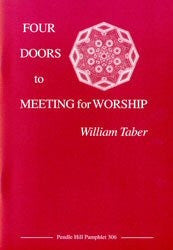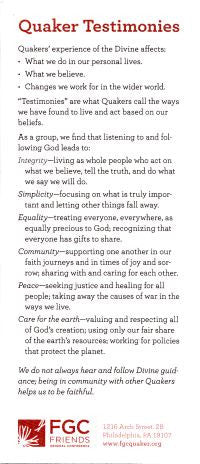If we consider the spiritual message of the Society of Friends apart from its social message, we must realize that “spiritual” and “social” are as intimately related as the two sides of a door; you can’t have one without the other. However, as in the case of a door, it is possible to concentrate attention on one side or the other. We can think of the “spiritual” as primarily concerned with our relation to our God and the “social” as primarily concerned with our relation to our fellows. Each is dependent on the other. In Quaker writings the phrase “joined to the Lord” seldom appears without the corresponding phrase “and to one another.” To be joined to the Lord results in being joined to one another, and being joined to one another results in being “joined to the Lord.” The word “spiritual” has many meanings, most of them vague. This word is used here in two clearly defined senses. First, the word “spiritual” designates our relation to the Divine which is within us as well as beyond and above us; and, second, the word “spiritual” describes a religion in which the outward form is a genuine and sincere expression of the inward state.
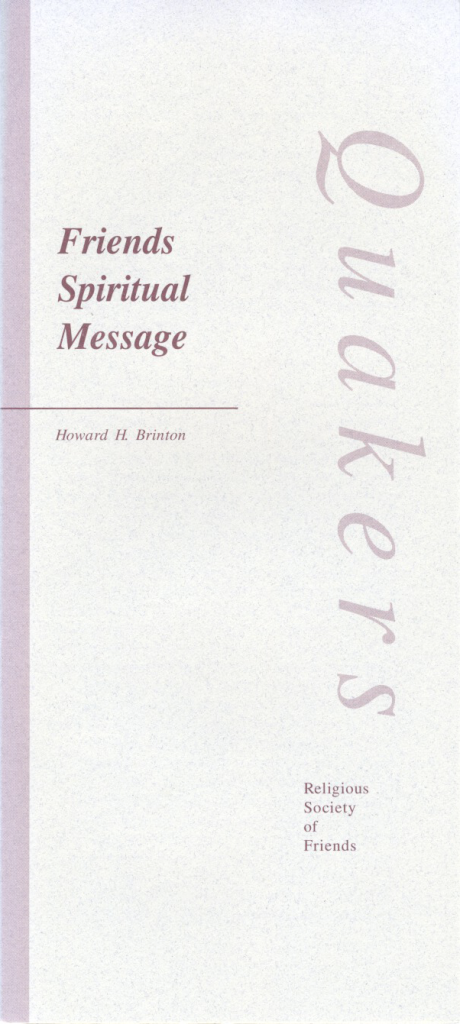
Friends Spiritual Message - bundle of 25
From the "Quakers" series, 5"x10" format.
Text:
The Inward Light
The first definition brings us to the Quaker doctrine of the “Inward Light” or “Christ within” or “that of God in everyone.” According to this belief, God reveals God’s life, truth, and love to every human being of every race and religion, directly, without the requirement of any intermediary such as church, priest, or sacred book. This doctrine is not unique, but the Quakers carried it to a logical conclusion in their worship, their church government, and their relations with others.
In the middle of the seventeenth century in England, because of printing, the Bible was becoming widely known, and it appeared to many who read it that the early Christian church depended very little on ecclesiastical structure, elaborate ritual, and formal creeds, but that it depended greatly on the Spirit in the midst of the worshiping group and on prophetic utterances inspired by the Spirit. Puritans wished to “purify” the church of accretions since the early days of Christianity. The Anglicans, being the most conservative, took out a few of these elements, the Presbyterians a few more, the Congregationalists a few more, the Baptists a few more, and finally the Quakers, being the most radical of the new sects, took out everything except dependence on the Divine Spirit for guidance and power. Quakerism was therefore a new revival of the old prophetic religion. The Spirit was not for them the third person of a trinity but God revealed inwardly as God had been revealed outwardly through Jesus of Nazareth. This is the Word, Light, Life, Truth, and Love in the language of John and “the Spirit” and “the Christ in you” of Paul.
This is all-sufficient for salvation because salvation consists in being completely obedient to God or, to use the term of a different theology, “in union with God.” It is interesting to note how the process of conversion occurs, as told in the most typical Quaker journals or autobiographies, though the word “conversion” is seldom used. There is no effort to save one’s soul by accepting a theological formula, though convincement of Quaker principles is generally the first step in the process. The writers describe how, gradually, after alternate victories and defeats, they become at last fully obedient to the will of God as inwardly apprehended and center their life in the light. Victory is never final and complete, but future lapses are more rare.
The Divine Spirit
This Divine Spirit, revealing itself in the depths of the soul, is thought of as a source of religious and moral knowledge, a source of power to act according to that knowledge, and a source of unity with others. Religious and moral knowledge, like the knowledge or appreciation of beauty, is not attained by a logical process of thought but by feeling. As some of our greatest psychologists have pointed out, feeling is as much an organ of knowledge as thought. It reveals values rather than facts. Outward authorities such as the Bible and the tradition of the church are important but secondary sources of truth. They can be understood and applied only through the spirit which first produced them. Conscience, as the particular organ which discerns moral truth, must be obeyed, but it is a true guide only insofar as we permit God to speak through it. Obviously, conscience is often influenced by prejudices and conventionalities.
Such a doctrine might appear individualistic, but, as the Quakers applied it, this was far from being the case. As well as functioning in the individual, the Spirit also works through the group as a whole, and individual insights must be checked and tested in the light of the insight of the whole group and the teachings of Christ. Even so, there can be no claim to infallibility. We each must follow such light as we have, however dim, trusting that, if we be faithful in the use of our one talent, more will be given.
The Spirit is also a source of strength. In reading the Quaker journals, which are our best source of information since they portray the lives of what might be called “standard Friends,” it is surprising to find what extraordinary power has sometimes been given to very ordinary men and women, farmers, homemakers, merchants, and others, who, without any special education or training for the task, set out on long journeys to preach the message of Quakerism to all ranks from the very lowest to kings and potentates. Once convinced that they were doing the Lord’s work, they could be stopped by nothing.
Unity With All People
The Spirit is also the source of unity, both within the group and with all people everywhere. The same, identical infinite Spirit of truth exists in all of us, and the more truly we are united with it the nearer we come to one another. Friends, accordingly, do not vote in making decisions as a group, for since there is only one truth and this truth is, in the long run, accessible to all, a patient search for it will eventually lead to unity. This means that each person in the group is present, not to defend an opinion, but to join in a common search and a united finding. A group of scientists would not think of arriving at a scientific truth by voting. For the same reason, the Quakers do not believe that the truth of an opinion is dependent on the number of those who hold it. For this reason also, the Quakers have not usually been seriously concerned about the smallness of their own numbers, though they recognize a responsibility to convince all people of truth. History shows that truth has generally appeared first in the possession of a small minority. This method of arriving at decisions reveals the basis of the Quakers’ peace principle, for which they are most widely known, perhaps because the peace principle is at present less generally accepted. Everyone today believes in peace, but a refusal to take any part in war or the preparation for war is an extreme to which few are willing to go. Yet if we believe that the divine light of truth is in every human being and that differences can be settled rightly and permanently only by an appeal to that light—what George Fox called “answering that of God in everyone”—then war is the wrong method. An appeal to peaceable methods is not always in the world’s eye successful. Therefore, anyone who uses this appeal must be prepared for loss and suffering. But this loss and suffering also accompanies recourse to violence.
Absence of Forms
We come now to the second meaning of the word “spiritual.” A religion is spiritual if every outward word and act is a genuine expression of an inward state. Such a religion avoids all forms which are routine and planned in advance, for such forms tend to become hollow and empty of content. For this reason the Quakers abandoned the outward form of the sacraments even though these visible manifestations are often genuine evidence of inward states. The meeting for worship is as nearly without forms as possible in order that whatever occurs may be a true and spontaneous expression of the life within. A sermon prepared in advance might be a true expression of the feelings of the minister at the time of preparation, but it does not necessarily arise out of the life of the meeting as a fresh and living revelation through the Spirit in the meeting. Hymns are not sung in the meeting because they put into the mouth of the worshipers words which may not at the time truly express their spiritual state. The Bible is not usually read in a meeting, for even this can become an empty form. The worshipers sit in silence, each endeavoring to commune with the Divine Presence in the midst and ready to express to the meeting any message which may arise in the mind as being clearly intended for the meeting as a whole.
It can be said that silence itself is a form. This is true, but it is not a form which commits anyone to any insincere act or speech. Friends are not opposed to addresses or lectures on religious subjects announced in advance, to Bible reading or to hymn singing; but such exercises are not included in a meeting for worship. This is considered to be a special kind of spiritual exercise where every effort is made to attain spontaneity, sincerity, and a fresh facing of reality.
In the past Friends sometimes leaned over backward in efforts to attain complete honesty and sincerity in speech. Many humorous anecdotes are based on this peculiarity. Such titles as Mr. and Mrs. (meaning master and mistress), your honor, your majesty, and reverend were avoided not only as being untrue, but as flattering the individual and ignoring the equality of all people before God. For the same reasons the plural pronoun “you,” formerly used to social superiors instead of the singular “thou,” was for a long time avoided as were taking off the hat, bowing, and other conventional manners. Closely allied with this effort to attain truth and sincerity was the testimony against every form of superfluity in dress, speech, and behavior. Simplicity is a form of genuineness. It means concentration upon that which is genuinely functional.
Quakerism is here described in terms of its ideals, not necessarily its attainments. In avoiding one form, Friends sometimes slip into another. Forms and creeds are inevitable. They have important uses, especially in education, where forms are used to show what ought to be their real content, and even, sometimes, to create the content. Our Christian religion would be weak and vague without the doctrines which undergird it. Quakerism does not aim at formlessness and undiluted mysticism. It is a peculiar and unusually stubborn effort to create a kind of religion in which the outward form expresses, as nearly as possible, the inward thought and life.
Author: Howard Brinton
“The Spiritual Message of the Society of Friends” first appeared as an article in the Friends Journal of November 5, 1955. It was modified for the sake of gender-neutral language by the Publications Committee of Philadelphia Yearly Meeting, 1992.

